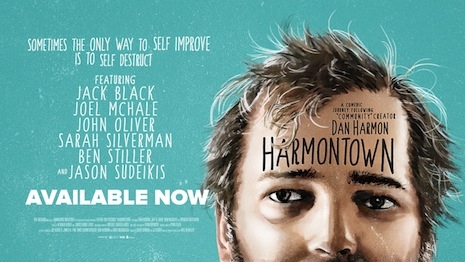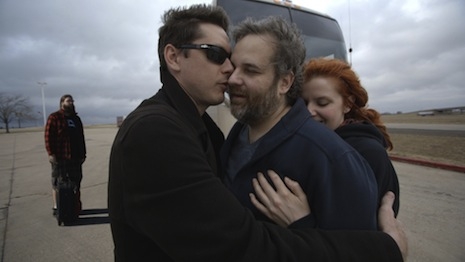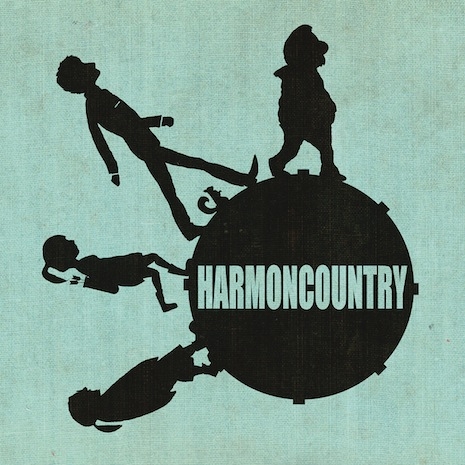
Last year I proclaimed Harmontown to be the best comedy podcast, and in the intervening time I have seen nohing to change my mind (although I have grown fond of Greg Proops’ Smartest Man in the World and Pete Holmes’ You Made It Weird. A couple of days ago saw the release of a documentary about Dan Harmon and the nationwide tour his podcast made in January 2013. It’s available to stream on Amazon for $6.99 (to purchase, $12.99/$14.99).
The question arises, how is it? The simple answer is, it’s very good. I’m a little too close to the subject to review it properly, so while recommending the documentary (directed by Neil Berkeley, who also directed Beauty is Embarrassing: The Wayne White Story) I thought I’d also express some thoughts about why Harmontown (the podcast) is such an achievement as well as a few things the documentary inevitably missed (not a diss, it would have been impossible to cover everything).

Spencer Crittenden, Jeff B. Davis, Dan Harmon, and Erin McGathy
Dan Harmon is a TV writer and showrunner who is responsible for Community (NBC) and Rick & Morty (Adult Swim). He’s from Milwaukee and he drinks too much and he’s got some impressive verbal gifts and he has issues with people telling him what to do. Harmontown (the podcast) is taped every Sunday at the NerdMelt Theater, the back room of Meltdown Comics in Hollywood. The governing conceit is that Dan Harmon is the mayor and his buddy Jeff B. Davis is the comptroller. Dan occupies a unique niche, as something like the world’s most dangerous showrunner (i.e. writer who oversees a television show). The advent of high-quality TV that requires attention to long-form narrative issues has made a figure like Harmon nearly inevitable—who knew who ran Kojak? If America loves Chuck Lorre’s shows, then that leaves an opening for an uncompromising indie showrunner who caters to a coterie—that’s Harmon, who plays Pulp to Lorre’s Oasis, perhaps.
Every show involves a mix of discussion about whatever has been occupying Harmon lately, audience participation, special guest appearances (Robin Williams, Patton Oswalt, Eric Idle, etc.) and a 20-minute chunk of D&D. The shows are entirely unscripted, and somehow they manage to be pretty darn diverting just about every week. As Davis points out in the movie, because it’s constructed from scratch every week, every episode feels completely different. What’s guaranteed is that because everything is filtered through Harmon’s lively, dangerous personality, there’s not much out there like it. What it feels like is unprecedented.
Harmon’s a dork of long standing, and his audience overwhelmingly consists of smart, introverted creative people (this is a euphemism for “on the Spectrum”) who, possibly, were bullied in high school; were far too interested in the Alien movie series and pop culture artifacts of that type; and have found some private fulfillment as adults in some interesting endeavor. What’s key is that the generosity, tolerance, and democracy behind Harmon’s sincere efforts at outreach have struck a massive chord among the people of this sub-sector, who in turn regard Harmon as their own special hero. The documentary is largely about Harmon going out into the country from LA to meet the throngs that make up his adoring audience. As Harmon often jokes, “his people” aren’t great at eye contact, which made the lengthy meet and greets after every session of “HarmonCountry” interesting social events in their own right.

The documentary covers all of this back story—the poster’s touting of the appearances of Ben Stiller, Jack Black, Joel McHale, and John Oliver is a bit of a cheat, they only appear in the movie for a couple of seconds apiece, as talking heads testifying to Harmon as a co-worker in the world of TV (Sarah Silverman and Jason Sudeikis are both in the movie in a fuller way). Implicit in that promotional strategy is that there’s not that much here to sell the movie. Much like Community, Dan Harmon himself is an aquired taste, and people watching the documentary should know that the movie features huge amounts of footage of exactly four people: Harmon, Davis, Harmon’s girlfriend (now fiancée) Erin McGathy, and Spencer Crittenden, the D&D dungeon master who was recruited from the live audience in an early episode and has appeared in the largest number of episodes since, excepting Dan himself of course).
Watching the movie, I found myself wondering what non-devotees will make of Dan Harmon. It’s a little like when you introduce your favorite noise-rock band to a friend, you might not have the best antennae about who will like this band. Same thing here—I love Harmon, but from all external appearances he’s a talkative alcoholic and egomaniac with a mean streak. It would be easy to imagine him wearing on people, which I sincerely hope doesn’t happen because I think Harmon’s worth the trouble. The thing to understand about Harmon is that he’s an idealist of the highest order. For instance, the HarmonCountry tour, even if it was the act of an egomaniac, was essentially an attempt to execute the world’s largest hug. A devotee of the Jungian mythologist Joseph Campbell, Harmon sincerely believes that his own writing accomplishments are merely a reflection of universal wisdoms that could equally well be expressed some other way. Harmon drinks too much and is self-destructive, all of which makes his penchant for unvarnished revelation all the more admirable. The list of his uncomfortable admissions (his purchase of a Real Doll many years ago, for instance) would be long indeed; would that we were all so honest! (Thus we see the idealism at work.)
One of the central issues in Harmontown the documentary is Harmon’s treatment of McGathy, who is clearly Harmon’s #1 supporter as well as his lifetime companion. The legendary Pittsburgh entry of HarmonCountry devolved into a huge onstage argument between Harmon and McGathy; the tour was clearly taking a massive toll on their relationship (they’re still together, obviously). Harmon did a bit about trying to become “visibly” aroused in full view of the audience by fantasizing about an attractive young lady in the audience, a bit that understandably wounded McGathy, who said so onstage some minutes later. The slack-jawed Pittsburghers were treated to a bit that wasn’t a bit, in essence a drawn-out, gut-wrenching conversation about the ways Harmon can wound McGathy and Harmon’s refusal to change.
Harmontown the documentary faithfully captures the complexity of Harmon and the appeal of the show, almost entirely. Inevitably, a documentary of this type must maintain its focus on Harmon and the rapid rise to nerdy prominence of Spencer, the D&D dungeon master. What a movie of this kind can’t, by definition, capture is one of the central sources of appeal of the podcast, which are the longer-form discussions/banter, and especially the longer set pieces in which Harmon improvs a rant about the injustice of being told to tie his shoes or the faulty logic of Uber or why Captain America is an unsatisfying movie. That’s the stuff I go to Harmontown for, and there’s virtually none of it in the documentary (again, not a diss; Berkeley made the right movie that was there to make). For that, go to Harmontown.com (episode 1) and listen to the podcasts. I wish they’d captured the dapper charm of Jeff B. Davis or the comedic genius—yes, genius—of Erin McGathy. In the movie you would get the impression that McGathy is a fairly typical supportive indie chick, but she has a lengthy background in improv and her comedic instincts are every bit as developed as those of Harmon himself. If anything she’s even quicker, and her bits don’t always depend on the filter of her own psychodramas. She has a podcast of her own about relationships called This Feels Terrible, which I highly recommend.
Download Harmontown the documentary—for some interesting insights into the making of the documentary, the Nerdist episode with Harmon and director Neil Berkeley is well worth a listen.